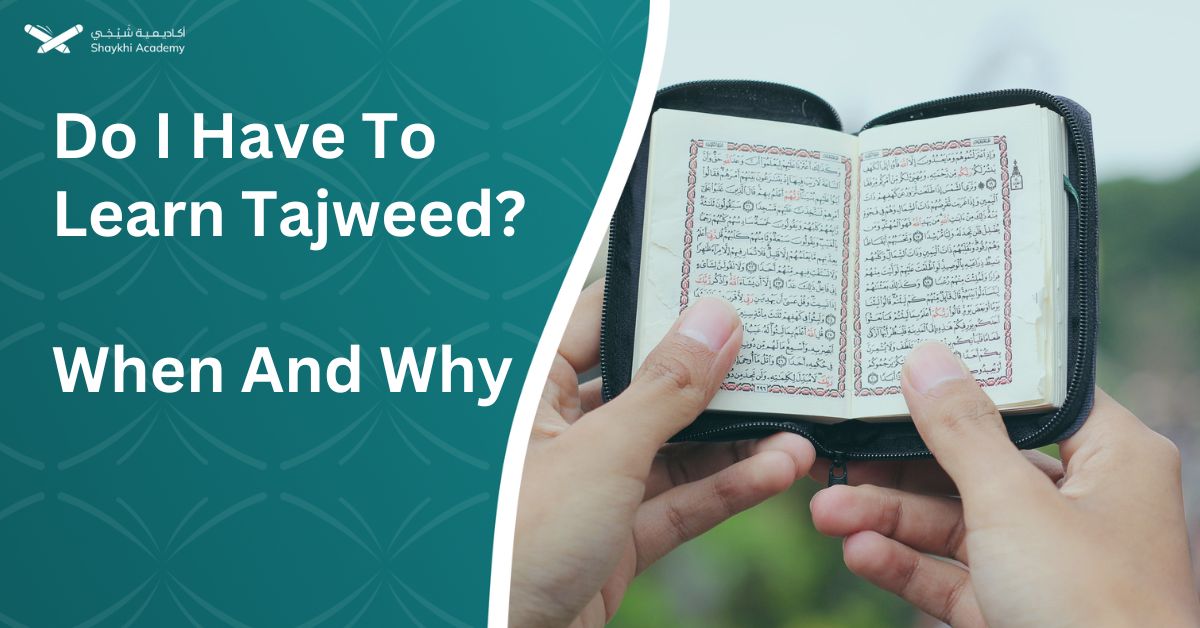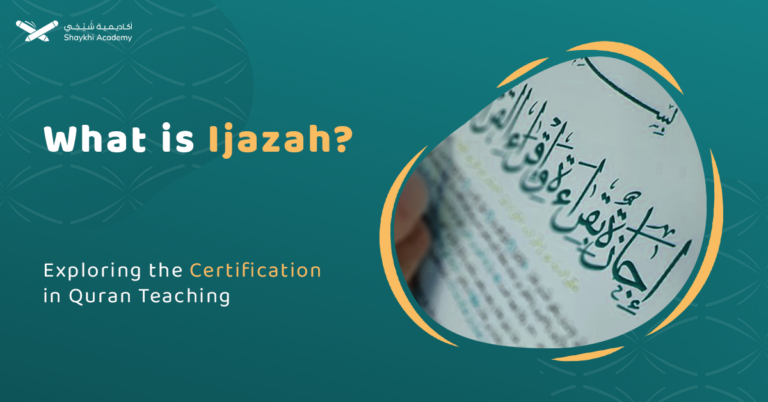Do I Have To Learn Tajweed? Learning Tajweed is crucial for Muslims as it ensures correct recitation of the Quran, preserving its authenticity and enhancing spiritual connection. Its importance varies based on individual roles, such as communal obligation for students, essential knowledge for prayer leaders, and foundational learning for children. Basic Tajweed is necessary for valid recitation in Salah and general reading, while advanced levels enhance the recitation’s beauty.
The Muslim who aspire to deepen their connection with the Quran wonders, do I have to learn Tajweed, the science of proper Quran recitation? This article explores this crucial question, delving into its importance and addressing whether Tajweed is an absolute requirement for both reciting the Quran and incorporating it into your daily prayers (Salah). Also, we’ll explore the benefits of reading the Quran with Tajweed rules and ultimately introduce the real position and function of Tajweed science in the Quranic learning journey of the Muslim.
Do I Have To Learn Tajweed?
There is no one answer to this question since it depends on the individual skills, circumstances, and level to decide whether learning Tajweed is an obligation for the Muslim or an extra good deed. Following are some cases to consider so that you know what is suitable for you:
1. Learning Tajweed To Fulfill Communal Obligation:
The responsibility to preserve Quranic Sciences is attributed to Muslim students and knowledge seekers, especially those residing in non-Islamic countries. They possess a communal obligation to learn Quranic sciences, including Tajweed. The responsibility extends beyond personal learning to delivering these honorable sciences to others, contributing to the preservation of these branches in societies where the prevalence of Arabic tongues is rare.
2. Learning Tajweed For Imams Leading Prayers:
Imams leading Muslims in prayers must correct their recitation and acquire the necessary understanding of oral Tajweed. This requirement ensures that they do not misguide those praying behind them or listening to their recitation, emphasizing the importance of maintaining accuracy in the spiritual guidance they provide.
3. Tajweed As Part Of Parents’ Role:
Parents, especially those raising children in non-Muslim countries, are encouraged to learn the minimum aspects of Tajweed necessary for correcting their recitation and that of their children. While not obligatory in the general sense, when parents are the only available source for their kids to learn the Quran, they bear extra responsibility to teach them the basic requirement of the correct oral practice of the Quranic recitation. Shaykhi Academy provides Quran courses for ladies that help mothers to achieve this goal.
4. Learning Practical Tajweed Is Recommended For Kids:
Kids are recommended to learn oral and practical Tajweed, particularly during the golden age of memorization and learning. Acquiring Tajweed skills at this stage ensures the accuracy of their recitation, laying a solid foundation for a lifelong connection with the Quran.
In conclusion, the obligation of learning Tajweed varies based on individual circumstances and roles within the Muslim community. Whether fulfilling a communal responsibility, guiding others in prayer, aiding children’s Quranic education, or nurturing the early learning stages, Tajweed holds significance in enhancing the accuracy and beauty of Quranic recitation.
Is Tajweed Obligatory In Salah?
Tajweed in its basic sense of keeping the words with no alteration or deletion is obligatory in salah and outside it as well for those able to learn and meet this requirement. More than this level is recommended in salah and Quran recitation in general.
We have discussed this topic in more detail in another article. Please refer to it for more illustration.
Can You Recite the Quran Without Tajweed?
While it is permissible to recite the Quran without delving into the intricacies of the advanced levels of Tajweed designed to enhance the beauty of the recitation, a fundamental understanding of the basic Tajweed rules is essential. The basic rules serve the crucial purpose of maintaining the correct pronunciation of Quranic words, ensuring that no alterations or deletions occur during recitation. This fundamental level of Tajweed is not an embellishment but rather a prerequisite for a valid and accurate recitation of the Quran.
It is noteworthy that a Muslim, capable of learning and elevating their proficiency in any Quranic science, including Tajweed, is encouraged not to forego the opportunity for extra reward. Learning Tajweed not only aligns with the Prophetic tradition, as exemplified by Prophet Muhammad (PBUH), but also fosters a closer connection to the divine words of Allah.
Choosing to engage with Tajweed, even at a basic level, signifies a commitment to preserving the authenticity of the Quranic text and reflects a sincere effort to approach the sacred scripture with reverence and precision. In doing so, a believer opens the door to a deeper spiritual experience, replete with the blessings and rewards associated with following in the footsteps of the Prophet and drawing closer to the divine essence.
Benefits Of Reading the Quran With Tajweed Rules
Reading the Quran with Tajweed rules, which translates to “beautification” or “making something good even better,” offers a multitude of benefits for Muslims. Here are some of the key benefits:
1. Tajweed Rules Help To Preserve The Meaning And Message Of The Quran:
The Quran is a masterpiece of the Arabic language, and its meaning can be easily distorted if the pronunciation is incorrect. Tajweed ensures that each letter is given its full due, preserving the intended meaning of the verses.
2. Tajweed Deepens Your Connection With Allah:
When you recite the Quran with Tajweed, you are doing an act of worship done by Prophet Muhammad (PBUH) and putting extra effort and care into presenting the words of Allah in the most beautiful and accurate way possible. This sincerity and effort can deepen your connection with Allah and increase your feelings of love and reverence for the Quran.
3. Tajweed Rules Improve Your Arabic Language Skills:
Learning Tajweed involves understanding the intricacies of Arabic pronunciation, including the proper articulation points of each letter, the characteristics of different sounds, and the rules of lengthening and shortening vowels, as well as some Arabic grammar rules. This knowledge can significantly improve your overall understanding and fluency in the Arabic language.
4. Practicing Tajweed Boosts Concentration:
The process of learning and applying Tajweed rules requires focus and concentration. Regularly practicing Tajweed can help you develop these skills, which can benefit you in other aspects of your life as well.
5. Tajweed Rules Increase Your Reward In The Hereafter:
Muslims believe that they will be rewarded for reciting the Quran, and the reward is even greater for those who recite it with Tajweed’s recommended rules.
6. Tajweed Application Sets A Good Example For Others:
When you recite the Quran with Tajweed, you are setting a good example for others, especially younger generations, and encouraging them to learn and appreciate the beauty of the Quran. Indeed, one of the criteria for prioritizing one over another in leading prayers is their knowledge of Quranic sciences as well as their practice.
Thus, learning and applying Tajweed rules is an essential part of properly reciting the Quran and reaping its many benefits in this life and the hereafter.
Start Learning Tajweed At Shaykhi Academy With Arabic Native Tutors
To conclude, if you are interested in learning more about Tajweed and how to practice it, start your Free Trial at Shaykhi Academy for the Online Tajweed Course. Remember, Tajweed is a means to serve a higher objective of becoming close to Quran messages and their application. Don’t fully immerse yourself in this temporary step of learning Tajweed. In this context, Shaykhi Academy also provides an Online Tafseer Course that helps you become closer to the Quran meanings and relate them to your daily life.

Conclusion:
Tajweed plays a significant role in fulfilling religious duties, maintaining accurate Quranic recitation, and fostering a deeper connection with the divine text. Whether obligatory or recommended, mastering Tajweed reflects a commitment to preserving the Quran’s integrity and embracing the spiritual benefits of its correct recitation.

















































